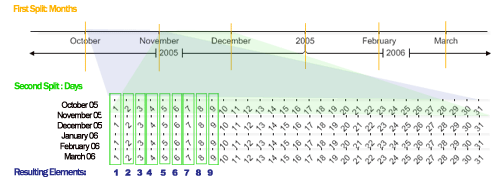| Overload | Description |
|---|---|
| SplitRegroupCalculate(TimeIntervalAdvanced,TimeIntervalAdvanced,Calculation) | Splits the elements based on the first split, then the resulting series are
grouped based on the second split. A simple analogy is a stretch of measuring tape
representing a timeline. The tape is cut into sections based on (first split), then
the pieces are stacked on top of each other and cut again based on the second
split. The resulting stacks are evaluated down to an element based on the specified
calculation. As a real world example, consider you have a series with web site traffic represented by an element for each time the website was visited including a date and time. This method can parse the data in a way that allows determining the traffic for each day of the week throughout the entire span of time. This means all the traffic going through the website on any monday would be calculated down to a single element, same for tuesday and so on. This illustration shows how the data is arranged.
|
| SplitRegroupCalculate(TimeIntervalAdvanced,TimeIntervalAdvanced,Calculation,String,Boolean) | Splits the elements based on the first split, then the resulting series are
grouped based on the second split. A simple analogy is a stretch of measuring tape
representing a timeline. The tape is cut into sections based on (first split), then
the pieces are stacked on top of each other and cut again based on the second
split. The resulting stacks are evaluated down to an element based on the specified
calculation. As a real world example, consider you have a series with web site traffic represented by an element for each time the website was visited including a date and time. This method can parse the data in a way that allows determining the traffic for each day of the week throughout the entire span of time. This means all the traffic going through the website on any monday would be calculated down to a single element, same for tuesday and so on. This illustration shows how the data is arranged.
|
| SplitRegroupCalculate(TimeIntervalAdvanced,TimeIntervalAdvanced,Calculation,String,TimeIntervalAdvanced) | Splits the elements based on the first split, then the resulting series are
grouped based on the second split. The subValuesDateGrouping option adds the
subValues to each resulting element grouped by the specified time interval. A
simple analogy is a stretch of measuring tape representing a timeline. The tape is
cut into sections based on (first split), then the pieces are stacked on top of
each other and cut again based on the second split. The resulting stacks are
evaluated down to an element based on the specified calculation. As a real world example, consider you have a series with web site traffic represented by an element for each time the website was visited including a date and time. This method can parse the data in a way that allows determining the traffic for each day of the week throughout the entire span of time. This means all the traffic going through the website on any monday would be calculated down to a single element, same for tuesday and so on. This illustration shows how the data is arranged.
|
| dotnetCHARTING | Send comments on this topic. |
| SplitRegroupCalculate Method | |
| See Also | |


|
| dotnetCHARTING Namespace > Series Class : SplitRegroupCalculate Method |




